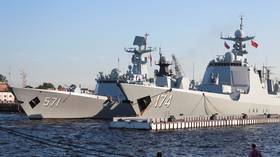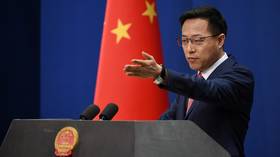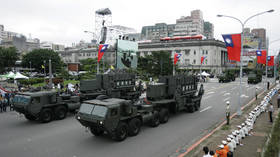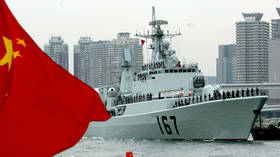Andrey Gubin: With potential Pelosi Taiwan visit imminent, why is the US provoking China in 'the most dangerous place on earth'

Today, East Asia is the scene of a sharp confrontation between two major nuclear powers – the United States and China. The situation is worsening as the Americans execute plans to contain Beijing. The key point of contention fueling these tensions is the Taiwan Strait. In recent years, Washington has increased its supply of weapons and military equipment to the island, while assisting in revamping the armed forces of Taiwan and strongly encouraging the local government’s desire for independence.
Taiwan holds extremely important geopolitical significance for the US and China, representing part of the ‘first island chain’ stretching from the Aleutian Islands in the north through Japan and the Philippines, to the Greater Sunda Islands in the south. It is this ‘Pacific frontier’ that both Washington and Beijing have defined as their main line of defense. The politicians in power on Formosa (which means ‘beautiful’ in Portuguese and is a name that prevailed in Western cartography until the 20th century) in recent years have consistently pursued a policy of strengthening ties with the US, which is fully consistent with Washington’s anti-Chinese rhetoric.
The leadership of the People’s Republic of China (PRC) has repeatedly made it clear that actions violating the One-China policy are unacceptable. This also goes for the provisions of the three joint US-Chinese communiques of 1972-1982, which form the basis of the countries’ bilateral relations.
The rhetoric coming from the Chinese government has become increasingly belligerent recently, as “the reunification of Taiwan with the motherland” is a fundamental national security interest for Beijing that warrants military force to defend if necessary.
Meanwhile, thanks to the vague wording of the 1979 Taiwan Relations Act, the US government prefers to avoid answering questions regarding the existence of concrete obligations to assist the island. At the same time, there is no real readiness at different levels of the American political system and in the expert community to move from economic and geopolitical confrontation with China to open conflict.
A prime example of the chaos reigning in the American establishment with respect to China is perfectly illustrated by US House Speaker Nancy Pelosi’s planned visit to Taiwan in August. The first reports about the potential trip to the island by America’s third highest office holder emerged in April 2022. However, that visit never took place, allegedly due to a positive Covid-19 test. Though Pelosi’s office has not published an official confirmation or denial, the Financial Times reported that sources familiar with the situation say the speaker’s visit is almost a done deal this time. As NBC's source later claimed, it stays unclear whether her Asia trip will include a stop on the island
Interestingly, in 1997, then-Speaker of the House Newt Gingrich visited Taiwan. However, that case was somewhat different, since he represented the Republican Party, which was in opposition to the Democratic administration of Bill Clinton. Pelosi and Biden belong to the same party, so this trip would actually personify Washington’s official foreign policy line with a pronounced anti-Chinese character. Also, information about the speaker’s visit appeared after the Biden administration confirmed its fifth plan to sell weapons and equipment to Taipei, amid negotiations that are currently taking place between Taiwan’s government and former US Secretary of Defense Mark Esper.
Beijing’s reaction to this unprecedented step was immediate. Foreign Ministry spokesman Zhao Lijian said that China strongly objects to any form of official exchange between the US authorities and the island of Taiwan, emphasizing that, since Congress is an integral part of the American political system, the requirement to adhere to the one-China principle and the content of the three joint Sino-American communiques fully applies to it. Pursuant to this, Beijing called on Washington to cancel the trip, stop ramping up tensions in the Taiwan Strait, and cease taking actions supporting Taiwanese secessionism. According to the Chinese Foreign Ministry, if the US follows its current course, China will take strong and resolute measures to protect its national sovereignty and territorial integrity, so Washington should keep in mind all the possible consequences of its actions.
The White House and Pentagon are probably not yet ready for long-term and unpredictable consequences in relations with the world’s second largest economy and navy. On July 21, President Biden said that senior US military officials do not consider Pelosi’s visit to Taiwan to be a good idea at the moment.
It is worth noting that Beijing is unhappy with any signs of support for Taipei coming from Washington. When the possibility of Pelosi’s trip was first discussed in April, four Chinese Air Force planes entered the southwestern part of the island’s self-proclaimed air defense zone.
Meanwhile, Chinese Foreign Minister Wang Yi complained to French presidential adviser Emmanuel Bonn that the US continues to pursue a policy of double standards on issues concerning territorial integrity and state sovereignty, while increasing turbulence in international relations. According to the minister, Beijing considers official visits of US political leaders to Taiwan to be deliberate provocations that serve as extremely dangerous signals to the whole world.
This position was shown on different levels: US Representative Rick Larsen said that an official from the Chinese Embassy and China’s consul general in San Francisco demanded that he tell the speaker to call the trip off.
The issue was also discussed between leaders. In a statement regarding a call between Joe Biden and Xi Jinping, Chinese officials used strong language when mentioning Taiwan: "Those who play with fire will perish by it. It is hoped that the U.S. will be clear-eyed about this".
The Global Times cites Chinese experts who believe Pelosi’s visit will have strategic consequences, because Beijing’s response should also be strategic, noting that the retaliatory actions that follow could be catastrophic for the US, which is currently experiencing economic difficulties. Lu Xiang, a researcher at the Chinese Academy of Social Sciences, believes that Washington’s determination to send the speaker to Taiwan demonstrates that the American authorities want to test Beijing’s patience and set a new threshold for admissible foreign policy actions.
Military expert Song Zhongping said America’s Democratic Party is doing everything it can to improve its position ahead of the congressional mid-term election, which will be held in November, and this includes showing support for democracy on the island. Chinese journalist Hu Xijin has proposed sending combat aircraft to escort Pelosi’s flight to Taiwan and deploying an aircraft carrier in the Taiwan Strait. If the Taiwanese military opens fire, Beijing reserves the right to destroy any targets on the island that pose a threat. And if the US dares to come to the rescue, then it would be time for liberation and reunification.
It is possible that American analysts believe that Beijing’s response will be soft and symbolic, assuming that the Chinese Communist Party will want to avoid an unnecessary confrontation with the US before the 20th National Congress of the CPC, which is important for Xi Jinping personally. On the other hand, there is absolutely no reason to count on softness from the Communists. On the sidelines of the G20 Summit in Bali, Indonesia, Wang Yi warned US Secretary of State Antony Blinken that the three joint communiques were inviolable. This should be interpreted unambiguously – as soon as Washington’s provocations go too far, bilateral ties with Beijing will be hopelessly damaged.
At the same time, the Chinese authorities are ready to go further in this case than they were during the ‘Taiwan crisis’ of 1996, when Beijing, Taipei, and Washington managed to reach a compromise. In a speech at the Shangri-La Dialogue in Singapore in June of this year, Chinese Defense Minister Wei Fenghe declared that Beijing would use force if anyone tried to tear Taiwan away from China and would fight to the bitter end.
In May 2021, The Economist called Taiwan “the most dangerous place on Earth.” According to the British publication, the constant maneuvers of Chinese warships around the island and the intrusion of aircraft into its ‘air defense zone’ are unequivocal evidence that preparations are being made for an imminent invasion, which can be expected as early as 2025. It is extremely disturbing that real anti-Chinese hysteria has been gaining momentum in the US since the Biden administration came to power. According to research by the Pew Center, up to 89% of the country’s adult population consider China a rival or an enemy, but not a friend, while every other respondent has extremely negative views on China.
In light of President Biden’s statement asserting America’s readiness to provide military assistance to the island in the event of an attack from the mainland, politicians and experts have urged Washington to change its official position on Taiwan, which has traditionally consisted of ‘strategic ambiguity’, to one with greater ‘strategic clarity’.
In January 2021, the outgoing administration of President Donald Trump released documents confirming Washington’s intention to protect Taipei in the event of aggression from the mainland. The ‘U.S. Strategic Framework for the Indo-Pacific’, originally subject to declassification only in 2042, suggests that the US should prevent China from gaining superiority at sea, and in the air, within the ‘first island chain’, while protecting all countries in the area, including Taiwan. Washington is probably not confused by the fact that it, de jure, does not classify the island as a country.
However, any conflict between Washington and Beijing would not be a ‘small victorious war’ for either side. Even if the PRC fails to quickly capture Taiwan, it will persist in fighting US forces in the Asia-Pacific region. On the other hand, even if the island is lost, the Pentagon won’t curtail its operations, because all of its previous efforts would be meaningless if it doesn’t neutralize the potential of the Chinese military. In December 2021, Foreign Affairs magazine warned Washington and Beijing that a conflict over Taiwan could prove ruinous for both themselves and most East Asian states, since the main participants could use nuclear weapons to change the situation in their favor if faced with defeat.
Undoubtedly, the US and China still have considerable space for dialogue on issues related to Iran, North Korea, and Russia, with which Washington has not been able to develop productive relations. However, if the White House does not stop threatening the PRC’s fundamental security interests, which undoubtedly include the ‘Taiwan issue’, Beijing will have no choice but to strengthen ties with countries that refuse to buckle to US hegemony and have suffered from its expansionist policies.
At the same time, China’s leadership, which has relied on building economic cooperation with other countries through the Belt and Road Initiative, as well as goodwill through humanitarian aid, now needs to intensify multilateral cooperation in the field of security in order to create a safe environment for the Middle Kingdom.















